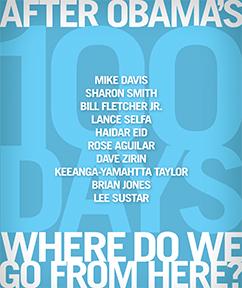Race and racism under Obama
Millions of people looked forward to Barack Obama's presidency with a sense of pride and hope. But Obama's first 100 days have raised critical questions about the limits of what we can expect from a Democrat in the White House--and what it will take to get the change we want.
What do you think of Obama's 100 days? And what does the left need to do now to move the struggle forward? We asked a group of writers and activists for their answers to these questions. This commentary is from , an editorial board member of the International Socialist Review, where her recent articles include "New Orleans Since the Storm: An American Travesty."
WHEN BARACK Obama won last November's presidential election, the mainstream media focused on the number of white voters who voted for Obama. While the 45 percent of whites who voted for Obama demonstrated the changing attitudes of race in the U.S., the reality is that Obama owed his electoral fortunes to the overwhelming turnout of African Americans in both the Democratic primaries and the national election last November.
From Harlem to Chicago to Atlanta and D.C., African Americans were literally dancing in the streets celebrating the victory of Obama, as if it were their own. Interviews of African Americans captured people declaring their first sense of pride in being American and feeling included in the country for the first time. This was not about patriotism per se, but recognizing the significance of the election as a blow against American racism.
Despite the unprecedented support Obama received from the African American community--and continues to receive, with approval ratings in the 90 percent range--in his first three months as president, he has very little to say about a number of issues directly affecting Blacks.
This is a carryover from the election itself. Obama made a widely praised speech about race in the U.S. midway through the primaries; he has yet to address the issue of race again in any meaningful way.
But Obama's avoidance of the issue and the media celebration of a "post-race" era hardly mean that race and racism have ceased to be a critical issue in the U.S.
Nineteen days before Barack Obama was inaugurated as the nation's first African American president, the public execution of a 22-year old Black man, Oscar Grant III, on a transit station platform in Oakland, Calif., demonstrated that despite the historic significance of Obama's election and what it represented in terms of the changing attitudes about race in this country, racism continues to persist and limit the opportunities of African American men and women.
Moreover, the cold-blooded killing of Grant exemplified the extent to which Black life continues to be expendable in the racist criminal justice system.
For two weeks, the police refused to interview the white transit cop, Johannes Mehserle, who killed Grant, allowing him to flee to Lake Tahoe. Mehserle was only arrested when authorities were concerned that the continuing demonstrations in Oakland against police brutality and racism would result in rioting.
Despite the national coverage of the Grant killings, Obama and his Justice Department have had nothing to say about this murder. Yet when four white cops in Oakland were killed several weeks ago, Obama personally sent a letter to the Oakland Police Department to be read aloud at the funeral.
The other central issue affecting African Americans in the U.S. today is the continued crumbling state of the American economy. It has also been especially disappointing that Obama has had next to nothing to say about the apocalyptic impact of the deteriorating economy on the African American community.
While unemployment in the U.S. stands at 8.5 percent, for African Americans, unemployment has climbed to more than 13 percent. There has also been little done to draw attention to the way in which the housing crisis is devastating Black communities because of the way in which prospective Black homeowners for much of the last decade were steered into predatory sub-prime loans, which account for a higher percentage of foreclosed properties.
Obama should be using his popularity and presence as the first African American president to highlight the overwhelming impact of the economy on Black communities and advocate even more investment in urban areas, the construction of affordable housing and a real jobs creation program that can permanently pull people out of poverty among other things.
In other words, ordinary people need more than cash infusions in the form of stimulus--we need the creation of a new welfare system that guarantees income, housing and health care.
It is still very early in the Obama presidency, and whether or not he and his administration respond to all of these issues remains to be seen. But is it is probably fair to say right now, that whether or not these issues get fully taken up will depend on the ability of our side to get organized and make these demands.



